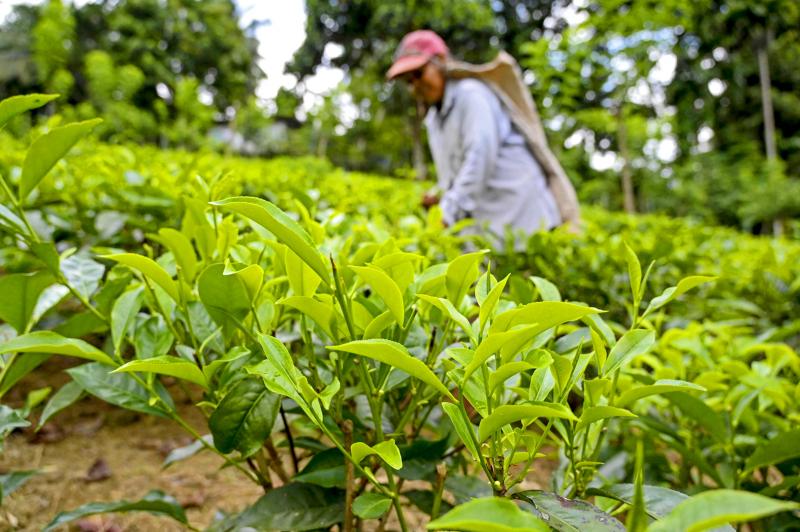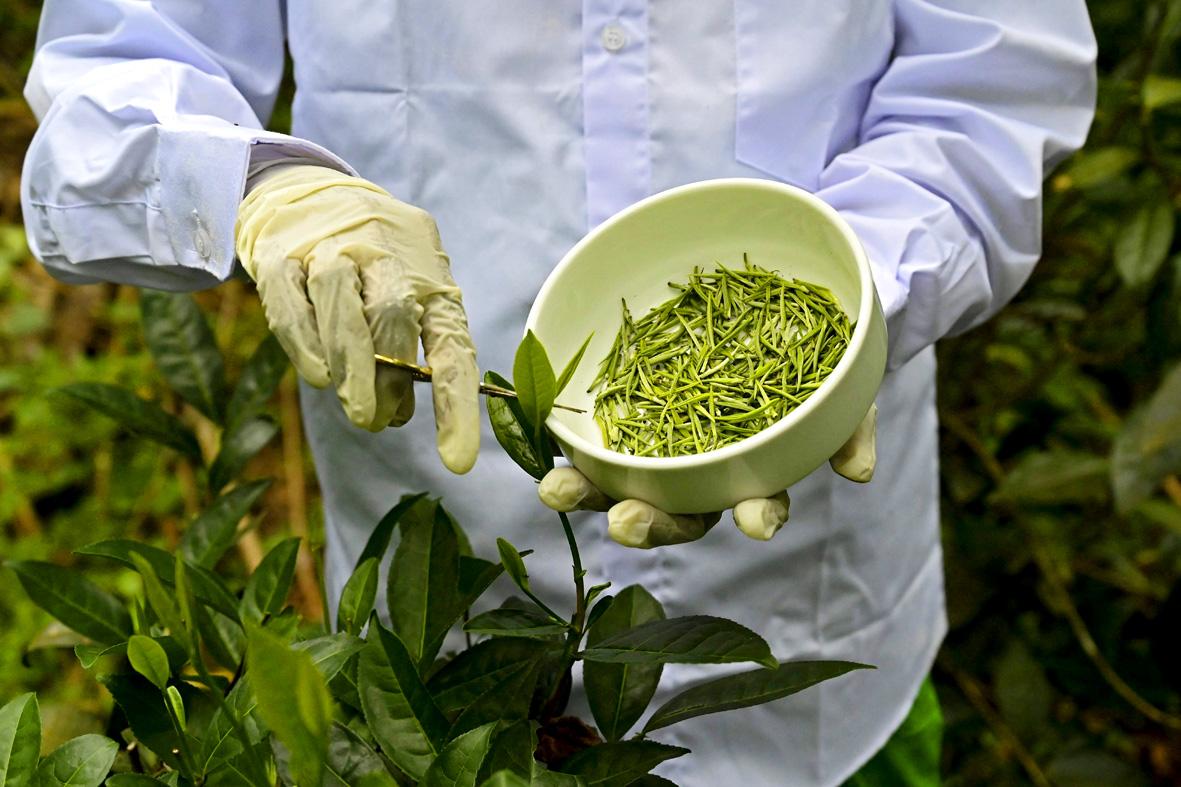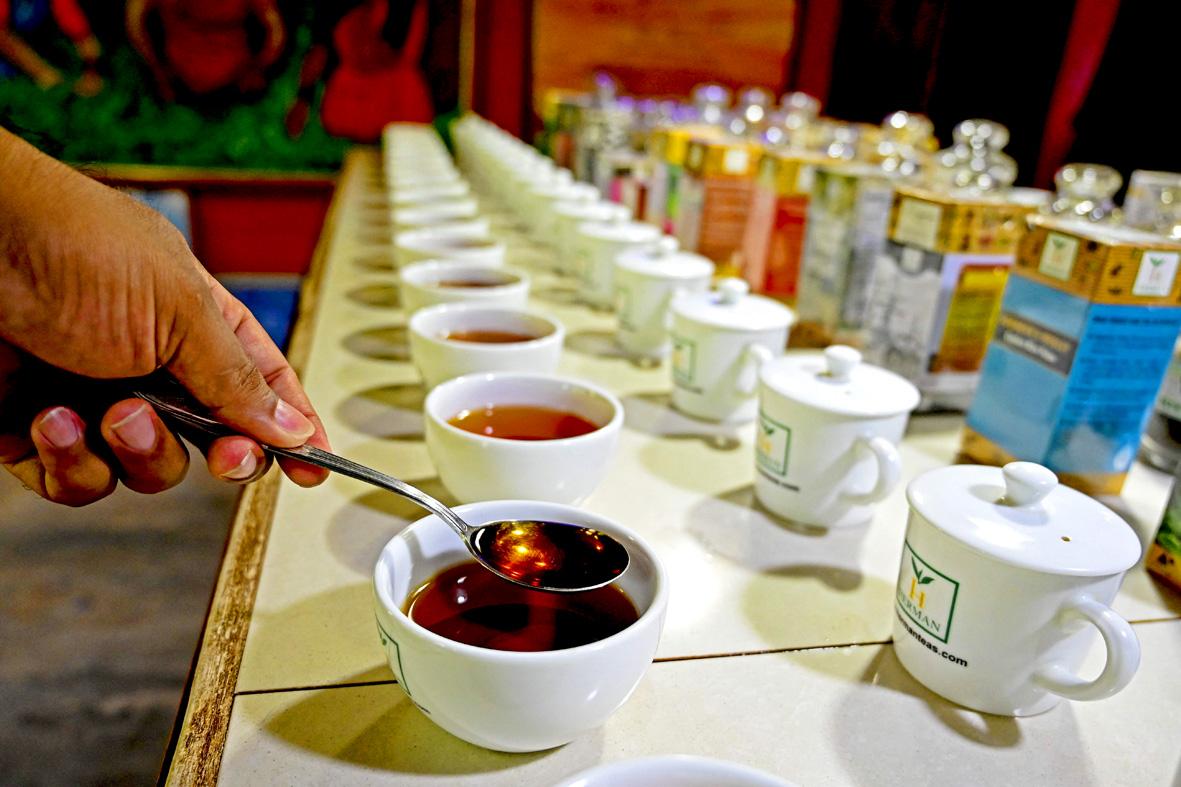Sri Lanka’s drive to become the world’s first 100 percent organic food producer threatens its prized tea industry and has triggered fears of a wider crop disaster that could deal a further blow to the beleaguered economy.
President Gotabaya Rajapaksa banned chemical fertilizers this year to set off his organic race but tea plantation owners are predicting crops could fail as soon as next month, with cinnamon, pepper and staples such as rice also facing trouble.
Master tea maker Herman Gunaratne, one of 46 experts picked by Rajapaksa to guide the organic revolution, fears the worst.

Photo: AFP
“The ban has drawn the tea industry into complete disarray,” Gunaratne said at his plantation in Ahangama, in rolling hills 160km south of Colombo.
“The consequences for the country are unimaginable.”
The 76-year-old, who grows one of the world’s most expensive teas, fears that Sri Lanka’s average annual crop of 300 million kilograms will be slashed by half unless the government changes course.

Photo: AFP
Sri Lanka is in the grip of a pandemic-induced economic crisis, with gross domestic product contracting more than three percent last year, and the government’s hopes of a return to growth have been hit by a new coronavirus wave.
Fertilizer and pesticides are among a host of key imports — including vehicles and spare parts — the government has halted as it battles foreign currency shortages.
FOOD SECURITY ‘COMPROMISED’

Photo: AFP
But tea is Sri Lanka’s biggest single export, bringing in more than US$1.25 billion a year — accounting for about 10 percent of the country’s export income.
Rajapaksa came to power in 2019 promising subsidized foreign fertilizer but did a U-turn arguing that agro chemicals were poisoning people.
Gunaratne, whose Virgin White tea sells for US$2,000 a kilo, was removed last month from Rajapaksa’s Task Force for a Green Socio-Economy after disagreeing with the president.
He says the country’s Ceylon tea has some of the lowest chemical content of any tea and poses no threat.
The tea crop hit a record 160 million kilos in the first half of this year thanks to good weather and old fertilizer stocks but the harvest started falling in July.
Sanath Gurunada, who manages organic and classic tea plantations in Ratnapura, southeast of Colombo, said that if the ban continues “the crop will start to crash by October and we will see exports seriously affected by November or December.”
He said his plantation maintained an organic section for tourism, but it was not viable. Organic tea costs 10 times more to produce and the market is limited, Gurunada added.
W.A. Wijewardena, a former central bank deputy governor and economic analyst, called the organic project “a dream with unimaginable social, political and economic costs.”
He said Sri Lanka’s food security had been “compromised” and that without foreign currency it is “worsening day by day.”
JOBS AT STAKE
Experts say the problem for rice is also acute while vegetable growers are staging near daily protests over reduced harvests and pest-affected crops.
“If we go completely organic, we will lose 50 percent of the crop, [but] we are not going to get 50 percent higher prices,” Gunaratne said.
Tea plantation owners say that on top of the loss of earnings, a crop failure would cause huge unemployment as tea leaves are still picked by hand.
“With the collapse of tea, the jobs of three million people will be in jeopardy,” the Tea Factory Owners Association said in a statement.
Plantations minister Ramesh Pathirana said the government hoped to provide organic compost in place of chemical fertilizers.
“Our government is committed to providing something good for the tea industry, fertilizer-wise,” he said.
Farmers say Sri Lanka’s exports of cinnamon and pepper will also be affected by the organic drive.
Sri Lanka supplies 85 percent of the global market for Ceylon Cinnamon, one of the two leading types of the spice, according to UN figures.
Still, Rajapaksa remains confident in his course, telling a recent UN summit that he was confident that his organic initiative will ensure “greater food security and nutrition” for Sri Lankans.
He has called on other countries to follow Sri Lanka’s move with the “bold steps required to sustainably transform the world food system.”

On April 26, The Lancet published a letter from two doctors at Taichung-based China Medical University Hospital (CMUH) warning that “Taiwan’s Health Care System is on the Brink of Collapse.” The authors said that “Years of policy inaction and mismanagement of resources have led to the National Health Insurance system operating under unsustainable conditions.” The pushback was immediate. Errors in the paper were quickly identified and publicized, to discredit the authors (the hospital apologized). CNA reported that CMUH said the letter described Taiwan in 2021 as having 62 nurses per 10,000 people, when the correct number was 78 nurses per 10,000

As we live longer, our risk of cognitive impairment is increasing. How can we delay the onset of symptoms? Do we have to give up every indulgence or can small changes make a difference? We asked neurologists for tips on how to keep our brains healthy for life. TAKE CARE OF YOUR HEALTH “All of the sensible things that apply to bodily health apply to brain health,” says Suzanne O’Sullivan, a consultant in neurology at the National Hospital for Neurology and Neurosurgery in London, and the author of The Age of Diagnosis. “When you’re 20, you can get away with absolute

When the South Vietnamese capital of Saigon fell to the North Vietnamese forces 50 years ago this week, it prompted a mass exodus of some 2 million people — hundreds of thousands fleeing perilously on small boats across open water to escape the communist regime. Many ultimately settled in Southern California’s Orange County in an area now known as “Little Saigon,” not far from Marine Corps Base Camp Pendleton, where the first refugees were airlifted upon reaching the US. The diaspora now also has significant populations in Virginia, Texas and Washington state, as well as in countries including France and Australia.

May 5 to May 11 What started out as friction between Taiwanese students at Taichung First High School and a Japanese head cook escalated dramatically over the first two weeks of May 1927. It began on April 30 when the cook’s wife knew that lotus starch used in that night’s dinner had rat feces in it, but failed to inform staff until the meal was already prepared. The students believed that her silence was intentional, and filed a complaint. The school’s Japanese administrators sided with the cook’s family, dismissing the students as troublemakers and clamping down on their freedoms — with